Sorry this was a bit delayed: I spent some time in the ER and eventually accompanied my elderly mom as she was admitted to the hospital yesterday. Anguishing as that was for Beth and I, during the endless waiting I kept thinking about these books, some which have become friends, nearly, important and valuable. When hard times hit us we are who we are, and I am glad that I’ve read the books I have that have helped shape me, a little anyway, to be a person who has at least some capacity to endure. Read now, friends, while you can! It matters.
WELCOME BACK TO PART TWO
Welcome back to Part Two of our annual recap of beloved and exciting titles that most caught my attention, honoring my favorite books this year past. I love seeing such lists, but I’m not very good at “Best of” lists, so don’t ask about my all-time favorite albums or movies. Books? I’ve got hundreds which I count as dear friends; each year there are many that I think deserve special accolades. So here we go, celebrating exceptional titles from 2015. The big first part of my list was posted a day or so ago, so don’t miss that.
I suppose you have plenty of books on your stack, but I hope you will consider ordering a few of these from us; part of our work here is to get the titles known, talked about, evaluated. We are, each of us, I trust, in some community of discourse, and we discern the good, the true, the beautiful, and more, in conversation with others. How about inviting these authors and their books into your conversations? Send us an order (we offer a good discount, too, for our BookNotes fans) and keep the conversations going!
BEST BOOKS OF BIBLICAL STUDIES
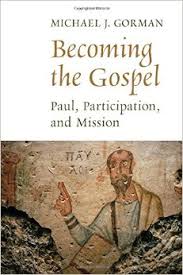 Becoming the Gospel: Paul, Participation, and Mission Michael Gorman (Eerdmans) $28.00 I do not need to say much about this recent release in the “Gospel and our Culture” series, as I’ve written about it a time or two before. I am delighted to note that Mike is a friend and customer, a supporter of our messy little shop here in Dallastown, and that he is as kind and personal and interesting in talking with us as he is when he is engaging in heady conversations with pals of his like Tom Wright or Richard Hays. Mike’s response to Fleming Rutledge’s serious presentation about her (Hearts & Minds Book of the Year award winner) The Crucifixion of Christ in December (at Saint Mary’s Ecumenical Institute where he teaches) drew pleasantly and insightfully on his own body of work, including a trilogy of academic works on Paul cap-stoned by this recent 2015 release. One doesn’t have to read Professor Gorman’s Cruciformity or Inhabiting the Cruciform God to appreciate Becoming the Gospel as it stands alone quite nicely. But there is a movement and trajectory to his work, and it moves us, to use the words he so diligently unpacks, to a formation that is participatory and missional. Whole life discipleship? Servant leadership? Kingdom living? Missional church? Walking the Jesus Way? All of these contemporary buzz words and phrases bring together the death of Christ, executed for our sake by the powers and the victory of the in-breaking reign of God. This kind of Biblical scholarship can surely fund a certain sort of thick, relevant, costly discipleship. Such a way of living out our faith can most fully be embraced as we deepen our understanding of what Paul proclaimed and taught about Jesus the Christ. This book, carefully argued and detailed as it, is as scholarly books are, will help us, I am sure of it. One of the best books of Biblical scholarship this year!
Becoming the Gospel: Paul, Participation, and Mission Michael Gorman (Eerdmans) $28.00 I do not need to say much about this recent release in the “Gospel and our Culture” series, as I’ve written about it a time or two before. I am delighted to note that Mike is a friend and customer, a supporter of our messy little shop here in Dallastown, and that he is as kind and personal and interesting in talking with us as he is when he is engaging in heady conversations with pals of his like Tom Wright or Richard Hays. Mike’s response to Fleming Rutledge’s serious presentation about her (Hearts & Minds Book of the Year award winner) The Crucifixion of Christ in December (at Saint Mary’s Ecumenical Institute where he teaches) drew pleasantly and insightfully on his own body of work, including a trilogy of academic works on Paul cap-stoned by this recent 2015 release. One doesn’t have to read Professor Gorman’s Cruciformity or Inhabiting the Cruciform God to appreciate Becoming the Gospel as it stands alone quite nicely. But there is a movement and trajectory to his work, and it moves us, to use the words he so diligently unpacks, to a formation that is participatory and missional. Whole life discipleship? Servant leadership? Kingdom living? Missional church? Walking the Jesus Way? All of these contemporary buzz words and phrases bring together the death of Christ, executed for our sake by the powers and the victory of the in-breaking reign of God. This kind of Biblical scholarship can surely fund a certain sort of thick, relevant, costly discipleship. Such a way of living out our faith can most fully be embraced as we deepen our understanding of what Paul proclaimed and taught about Jesus the Christ. This book, carefully argued and detailed as it, is as scholarly books are, will help us, I am sure of it. One of the best books of Biblical scholarship this year!
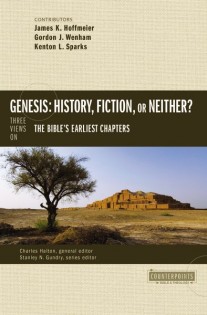
Genesis: History, Fiction, or Neither? is a wonderful overview of three ways to approach many key portions of Scripture, and a study of ancient truth, ancient historiography, and modern application of Holy Scripture. This conversation has implications for our view of the unity of Scripture itself, some say. The authors are all earnest evangelical Biblical scholars and while the conversations are heated, at times, it is a healthy and good discussion. We admire these kinds of educational panels and the interplay of different voices, and think they are edifying. Even though these authors are evangelicals, by the way, this would be great to use in more mainline circles. Kudos to Stanley Gundry who is the general Counterpoint series editor, and kudos to the particular editor of this one, and to the authors for pulling off such a robust and important conversation.
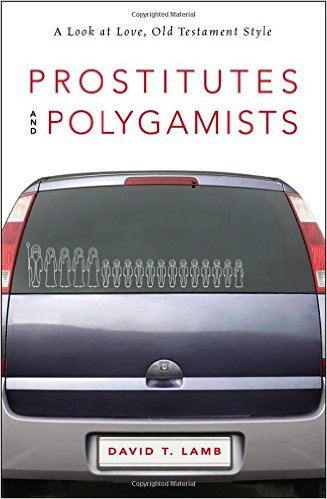 Prostitutes and Polygamists: A Look at Love Old Testament Style David T. Lamb (Zondervan) $16.99 From the moment I saw the hilarious cover, I knew I’d like this book by the popular author of God Beha
Prostitutes and Polygamists: A Look at Love Old Testament Style David T. Lamb (Zondervan) $16.99 From the moment I saw the hilarious cover, I knew I’d like this book by the popular author of God Beha
ving Badly: Is the God of the Old Testament Angry, Sexist and Racist. To say he is light-hearted is an understatement – the book is loaded with puns and quips and great footnotes with sometimes snarky references to TV shows from Love American Style to Arrested Development. He’s no slouch (he has a book on Oxford University Press, and is working on a major commentary on 1 & 2 Kings) but in P&P he picks up the style of his previous one – upbeat, clever, conversational, practical. He tries to answer tough questions that ordinary folks tend of have with fairly conventional answers. He’s no wooden literalist but he’s not a deconstructing higher critic, either. Endorsements on the back come from reliable mainstream scholars such as John Goldingay, Christopher J.H. Wright, Tremper Longman (who says, “Once you start reading this book you won’t be able to put it down.”) One scholar says he is “sensible and down-to-earth.” Frank Viola says, “The only books I read these days are those which throw fresh light on Scripture or challenge traditional presuppositions. Top-rated Old Testament scholar Richard Lamb has done both.” Well, for those who read radical feminist critics or explore anti-imperialist readings, these ruminations by Lamb, actually, may not do enough of either, but for those who want respectable, interesting, plausible answers to fair questions for ordinary people, this is truly a great step in the right direction.
Here are two reasons I want to honor this book. Firstly, it is a great example of the kind of accessible Biblical scholarship that is appealing, fun, funny, applicable, humble, and useful. That Lamb makes the Bible come alive, and gives us fascinating information about background, context, cultural stuff that illuminates our understand of the text, is just the sort of Bible teaching needed these days. Lamb would be the first to admit, I’d bet, that he isn’t doing high-level scholarly discourse for the academic guild of Biblical studies. But if you are involved in a home Bible study or teaching junior high Sunday school, or leading family devotions, or chatting with your young adult friends over brews, you don’t need arcane didactic word studies from a dogmatic fundamentalist and you don’t need a hiply ironic, overly academic journal article from SBL. Lamb does real-world evangelism and on-campus apologetics, answering tough questions the best he can, and he gives us here tools to understand and explain weird sexual practices seemingly condoned in the Bible while showing why it matters to our own formation of sexual ethics today. Three cheers for lively, contemporary, smart but down-to-earth Bible teachers who help us not only understand certain Bible quandaries, but gives us a healthy, reasonable style of study, a balanced hermeneutic, if you will that increases our own capacity to trust the goodness of the Scriptures.
And, secondly, not only is he sharp and whimsical and able to laugh even at the weirdo stuff in the Bible, Lamb is obviously eager to help us know God’s grace, to live well, to have the big Bible story be our own narrative; he wants to bless us with a sturdy confidence that God’s redemptive work unfolding in the storyline of the Bible points us to Christ and His saving grace. In his own remarkable admission that he, like all of us, is a sinner, sexually and otherwise, we are set free from false pretenses, liberated to ask hard questions of ourselves and our culture (and even of the Biblical text) which allows fresh, reasonably satisfying answers to spring forth among us.
Look: I don’t know if Lamb is always right about every jot and tittle – there’s a lot of jots and tittles in this complex, big book we call the Holy Bible – and I don’t know if his fairly traditional evangelical application is spot on in every case. But he’s a good man, a good teacher, a lover of God’s Word and a lover of people, and he wants to help us all grapple with the Scriptures, discover more deeply God’s grace, and learn to be shaped by Biblical truth, despite the confusing and odd and colorful ways in which it comes to us. And for that, we can all be grateful.
A SAVORY AWARD: BEST BOOK ABOUT LIVING ABUNDANTLY
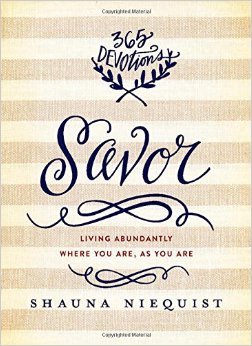 Savor: Living Abundantly Where You Are, As You Are Shauna Niequist (Zondervan) $16.99 I didn’t want to name this under the category about daily devotionals or spiritual formation in Part One of our “Best of 2015” lists. Although Savor is a lovely collection of 365 short daily readings, with a Bible verse starting each reading, by an inspirationally Christian writer, it seemed somehow something other than that. This is a way to dip in to previous writings of Shauna Niequist and add in some new reflections and suggestions for gracious living. The format is like a daily devo, but the approach is broad. We are invited to trust God, to trust the goodness of the world God made: reality is hard, tragic, even, and Niequist knows this, but through it all we can rally to see the grace God offers, a shot at redemption in the mundane ordinary stuff of life. Savor really is a call to pay attention to daily life, to savor the details, to enjoy and feel (and lament) what is really around us. Wonder, joy, goodness, betrayal, sadness, failure. One of Niequist’s book is called Bittersweet, after all, and there are excerpts of it here.
Savor: Living Abundantly Where You Are, As You Are Shauna Niequist (Zondervan) $16.99 I didn’t want to name this under the category about daily devotionals or spiritual formation in Part One of our “Best of 2015” lists. Although Savor is a lovely collection of 365 short daily readings, with a Bible verse starting each reading, by an inspirationally Christian writer, it seemed somehow something other than that. This is a way to dip in to previous writings of Shauna Niequist and add in some new reflections and suggestions for gracious living. The format is like a daily devo, but the approach is broad. We are invited to trust God, to trust the goodness of the world God made: reality is hard, tragic, even, and Niequist knows this, but through it all we can rally to see the grace God offers, a shot at redemption in the mundane ordinary stuff of life. Savor really is a call to pay attention to daily life, to savor the details, to enjoy and feel (and lament) what is really around us. Wonder, joy, goodness, betrayal, sadness, failure. One of Niequist’s book is called Bittersweet, after all, and there are excerpts of it here.
I love the feel and heft of this earthy volume, the solid pages, the textured, earth tone cover and the hints of blue on the pages. It is beautifully made, conversational but wise, and a very, very useful resource as you attempt to live in new ways, breaking into Kingdom thinking rather then being stuck in old views and old habits.
“Sink deep into the everyday goodness of God and savor every moment!” she exclaims. In the hands of some other writers this would seem to easy, or too sublime, or too shallow. Niequist gets it just right, and although I am not quite as energetic in my zeal for abundant moments, I’m with her in her hope that we can read and pray and live and behold. She even includes some recipes (some already in Bread and Wine and some new) to make this book come alive as a useful tool for your own lifestyle. Love it. Kudos!
BEST BOOK ABOUT URBAN CRIME, POLICE WORK, CRIMINAL INVESTIGATION PROSECUTION
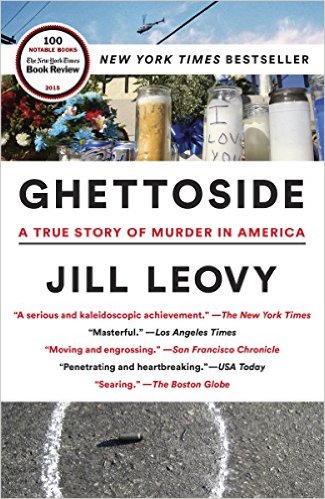 Ghettoside: A True Story of Murder in America Jill Leovy (Spiegel & Grau) $16.00 To explain: I have been brought to tears, weeping many times this year listening to a powerful song called “The New Jim Crow” on the latest Indigo Girls album One Lost Day. The heady book of that name by Michelle Alexander to which the song alludes is a serious study of the racism undeniably evident in the crisis of what is now called mass incarceration. One of our selections for Best Books of last year – now out in paperback – was a passionate, story-filled, illuminating similar work called Just Mercy: A Story of Justice and Redemption by African American legal activist Bryan Stevenson (who we first heard at the Jubilee conference in Pittsburgh years ago, introduced to us as he was by Tony Campolo, Bryan’s college mentor.) With the much-discussed scholarship of Alexander’s New Jim Crow and the best-selling passionate testimony about Bryan Stephenson’s legal aid work told so well in Just Mercy – not to mention the horrors of police violence and dramatic debate about law enforcement tactics and judicial outcomes in places like Ferguson, MO – American is on high alert about the issues of urban crime, about police work, about race and class and economics and politics in the complex work for the common good in our urban centers. Add in the popularity of so many Law and Order type crime shows, and the award winning power of The Wire, and you realize that this recent book by award winning journalist Jill Leovy was poised to be a best-seller. Released last January in hard-cover, now out in paperback, it was doubtlessly one of the best books I read all year – I sat on the couch and would hardly budge, reading, reading, reading, exclaiming on every page how very interesting and eye-opening it was. I’m not much of a true crime buff, but this was simply spectacular, how it was written, the pacing and story arc, and the actual story and topic. I wrote about it (here) and cannot say enough about it.
Ghettoside: A True Story of Murder in America Jill Leovy (Spiegel & Grau) $16.00 To explain: I have been brought to tears, weeping many times this year listening to a powerful song called “The New Jim Crow” on the latest Indigo Girls album One Lost Day. The heady book of that name by Michelle Alexander to which the song alludes is a serious study of the racism undeniably evident in the crisis of what is now called mass incarceration. One of our selections for Best Books of last year – now out in paperback – was a passionate, story-filled, illuminating similar work called Just Mercy: A Story of Justice and Redemption by African American legal activist Bryan Stevenson (who we first heard at the Jubilee conference in Pittsburgh years ago, introduced to us as he was by Tony Campolo, Bryan’s college mentor.) With the much-discussed scholarship of Alexander’s New Jim Crow and the best-selling passionate testimony about Bryan Stephenson’s legal aid work told so well in Just Mercy – not to mention the horrors of police violence and dramatic debate about law enforcement tactics and judicial outcomes in places like Ferguson, MO – American is on high alert about the issues of urban crime, about police work, about race and class and economics and politics in the complex work for the common good in our urban centers. Add in the popularity of so many Law and Order type crime shows, and the award winning power of The Wire, and you realize that this recent book by award winning journalist Jill Leovy was poised to be a best-seller. Released last January in hard-cover, now out in paperback, it was doubtlessly one of the best books I read all year – I sat on the couch and would hardly budge, reading, reading, reading, exclaiming on every page how very interesting and eye-opening it was. I’m not much of a true crime buff, but this was simply spectacular, how it was written, the pacing and story arc, and the actual story and topic. I wrote about it (here) and cannot say enough about it.
I do not know if the urban policing has changed much since the horrible years documented in this book (think Straight Outta Compton or Boyz in the Hood-era south LA.) We know that Ta-Nehisi Coates National Book Award winning Between the World and Me (speaking of breathtakingly spectacular writing) has brought great eloquence and passion to the experience of black life in these United States, even as his earlier memoir set in Baltimore, The Beautiful Struggle, so colorfully captured the dangers of life in the inner city. I suppose I don’t need to ramble on about how pertinent all this is; you know.
Ghettoside is about what some call “black on black” shootings, and how local police in LA do or don’t investigate or prosecute these admittedly tragic and violent and culturally complicated crimes. Race and class and cultural differences make police investigations exceptionally difficult, and the gangs and thugs and urban social networks seem aligned to inhibit justice being served. The complexities and injustices and violence and weirdness of all this makes for important (even riveting) reading, and I think anyone who thinks about, speaks, or writes about, contemporary policing should be aware of these hard circumstances and vexing scenarios. What an informative, gritty read this was, and how entertaining, even. Like the ubiquitous cop and lawyer shows or legal thriller novels, Ghettoside puts you on the edge of your seat, grabs you tight and doesn’t let go till you turn the last page.
Here’s another reason I want to name and honor this book: it shows a fascinating, inspiring example of a person living out their calling with zeal and courage and dogged determination to make a difference. The hero of the story is a driven, honest cop, named Detective John Skaggs, and his diligence and insight – discovering and embodying best practices in his craft – is fabulous to behold and a good case study of the heady philosophical/theological stuff that those of us in the faith-work conversations often talk about. It also seems to illustrate the body knowledge sense of deep knowing that Jamie Smith or Matthew Crawford writes about, a lived awareness of one’s surroundings and the habits needed to thrive in one’s vocation. Many of the officers and detectives doing the investigation (year after long year) of the murder documented in Ghettoside are good guys, a few are exemplary, and the main hero – a white cop! — is nothing short of that, an American hero.
Do Black Lives Matter, with or without a hashtag? As little as a decade ago a vast, vast number of murders of people of color were routinely left unprosecuted. In some way, this stunning fact seems to be one root or our current unrest, a deep, institutional legacy of disregard of mostly black, mostly urban, mostly young men. This can now longer be ignored, not only because of the relentless work of a few serious law enforcement workers to change their departments habits, but because of journalist Jill Leovy, who has written so compellingly about it. I salute John Skaggs, and thank Ms Leovy for telling his story.
BEST BOOK TO UNDERSTAND THE CHANGES WITHIN THE CHRISTIAN RIGHT
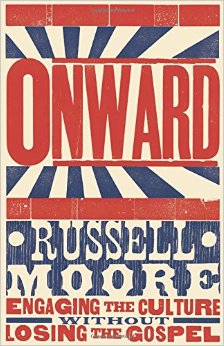 Onward: Engaging the Culture without Losing the Gospel Russell D. Moore (Broadman Holman) $24.99 Anyone who has heard or met Rev. Moore will know him to be a kind and gracious man, thoughtful and serious-minded about how to live out the full-orbed implications of the true gospel in a culture that he believes to be fading quickly from health and wholeness. Yet, he is a man alive, on a mission, and is full of generous hope. He has written widely (for instance, a good exegetical book about the temptations of Jesus, and a rousing book about the need for reform and charity in the field of orphan care and adoption.) This recent book captures his sense of urgency, but tempered with grace and hope. It is exceptionally significant; a bellwether book indicating huge changes afoot in what has often been called the Christian right.
Onward: Engaging the Culture without Losing the Gospel Russell D. Moore (Broadman Holman) $24.99 Anyone who has heard or met Rev. Moore will know him to be a kind and gracious man, thoughtful and serious-minded about how to live out the full-orbed implications of the true gospel in a culture that he believes to be fading quickly from health and wholeness. Yet, he is a man alive, on a mission, and is full of generous hope. He has written widely (for instance, a good exegetical book about the temptations of Jesus, and a rousing book about the need for reform and charity in the field of orphan care and adoption.) This recent book captures his sense of urgency, but tempered with grace and hope. It is exceptionally significant; a bellwether book indicating huge changes afoot in what has often been called the Christian right.
Moore is a public policy guy, a leader of the Ethics and Religious Liberty Commission for the Southern Baptists, and he is bringing a somewhat different vision and tone to his work there. His predecessor was pretty much a partisan Republican, rather strident at times, with not much energy for issues of poverty, creation-care, race and the like, focusing rather on electing fiscal conservatives and anti-abortion legislators. Moore made it clear when he took Mr. Land’s position a few years ago that he intended to do at least two things as an public advocate for the country’s largest Protestant denomination: he was going to keep first things first and preach the gospel of Christ, and, secondly, he was going to be more Biblically-nuanced, less single-isuey and more diverse in terms of what issues addressed and how he addressed them. It is wonderful, in my view, to see a conservative so very interested in compassion, in social justice, in Biblical mandates for caring about the environment, and global human rights. Moore is a vibrant evangelical Christian, and he has a fairly traditional view of many of these things – if one realizes that the “traditional family values” of the Moral Majority and the like were, in fact, not very traditional in terms of historic Christian social ethics. Kudos to Russell Moore for his passionate, gospel-based vision of the relationship of evangelical faith and social concern, for his loyalties to Christ even as he offers insight and leadership on how to be good citizens and good neighbors.
Onward does just what it offers, and reflects wisely, and clearly, about the Kingdom of God, the nature of the gospel, about our mission, our culture, how need for “convictional kindness.” He tells great stories the way a Southern preacher can, and while I might not always say things quite the way he does, and might tweak his positions here and there, I am glad for such an intelligent and eloquent advocate of the gospel itself, and how he brings energy and courageous moderation to his guidance on various social issues and tension points in the struggle for cultural renewal. The discourse about evangelical faith the common good just got a whole lot better, and we should all be grateful for this fresh voice. Kudos!
BEST BOOK WRITTEN FOR CHRISTIAN WOMEN
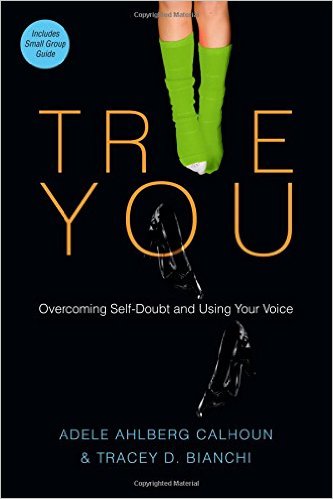 True You: Overcoming Self-Doubt and Using Your Voice Adele Ahlberg Calhoun & Tracey D. Bianchi (IVP) $16.00 I think the IVP Crescendo line of books is doing some of the most consistently good titles in the religious publishing world today. I’ve read most of them and think they are a blast — always interesting, caring and warm, but not smarmy or condescending, the way some evangelical books for women tend to be. This wonderful book, which is exceedingly relevant and very, very important, is a perfect example of the thoughtfulness and wisdom that goes into these sorts of books. It is savvy and smart, but not academic or arcane. It is full of deep Christian insight, nicely explained. It is honest and real and helpful.
True You: Overcoming Self-Doubt and Using Your Voice Adele Ahlberg Calhoun & Tracey D. Bianchi (IVP) $16.00 I think the IVP Crescendo line of books is doing some of the most consistently good titles in the religious publishing world today. I’ve read most of them and think they are a blast — always interesting, caring and warm, but not smarmy or condescending, the way some evangelical books for women tend to be. This wonderful book, which is exceedingly relevant and very, very important, is a perfect example of the thoughtfulness and wisdom that goes into these sorts of books. It is savvy and smart, but not academic or arcane. It is full of deep Christian insight, nicely explained. It is honest and real and helpful.
The authors themselves are classic — and what a pair they are! Calhoun is known for having written some very thorough guides to deeper contemplative living, such as the amazing resource, The Spiritual Disciplines Handbook (which was recently expanded and reissued in a lovely new edition, by the way.) She has an MA from the studious Gordon Conwell Theological Seminary and has been trained as a spiritual director. Tracey Bianchi, though, strikes me as a bit more, well, energetic. Her previous books — one about why young moms need to connect with other moms and form vibrant relationships and a fun one called Green Mama: The Guilt-Free Guide to Saving the Planet — are upbeat and lively. Both seem to be pretty hip gals, and uniting a middle aged contemplative spiritual director and a younger, quite relational, funny mom activist, is fantastic. They said in an interview that they known each other for two decades and that they “want to peel away the layers of doubt and drama that often weigh down our hearts and disguise our voices. Who am I? What does God want me to say and do in this world? And what is getting in the way of my doing just that?”
As Adele has put it, women need to be able to say, “I have a voice that is worth hearing, a story that is worth telling, and a purpose worth realizing.” Something, though, is preventing that, and it is troubling. There is self-doubt and anxiety. The world, and the church, and especially the evangelical wing of the church which they represent, needs the voice of women.
By the way, I don’t like the cover at all. The glass shoes with heels? The goofball socks? Don’t let the confusion of that design turn you away, as I fear it could: this is a great book, one of the best of 2015.
BEST BOOK ON EVANGELISM
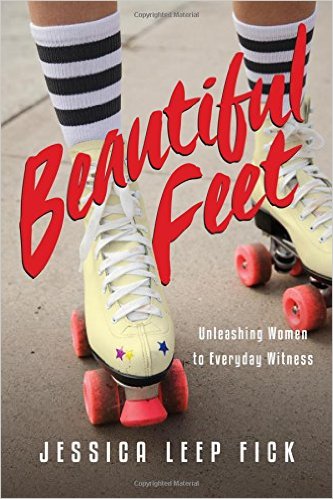 Beautiful Feet: Unleashing Women to Everyday Witness Jessica Leep Fick (IVP) $16.00 We have dozens and dozens of books on evangelism, and I get tell you my favorite few, our top ten, or suggest some that would be good for you given your own religious orientation or denominational ethos. From the most progressive mainline church to the most rigid Reformed ones and anything in between, there are resources that can help us all grapple with what it means to bear witness to God’s saving grace in Christ and to find ways to help unchurched folks find a relationship with God, reconciled with their Maker by receiving God’s forgiveness. I think most of us don’t do this very well, and everybody is anxious about not offending anyone (and those that aren’t, well, they probably should be.) In this pluralistic, post-Christian world, there are great, fresh opportunities to advance the Kingdom of God by inviting people and families, organizations and institutions, into an awareness of the mercy that surrounds us and into a submission to the Lordship of King Jesus. It’s exciting, complicated, and not a little bit perplexing.
Beautiful Feet: Unleashing Women to Everyday Witness Jessica Leep Fick (IVP) $16.00 We have dozens and dozens of books on evangelism, and I get tell you my favorite few, our top ten, or suggest some that would be good for you given your own religious orientation or denominational ethos. From the most progressive mainline church to the most rigid Reformed ones and anything in between, there are resources that can help us all grapple with what it means to bear witness to God’s saving grace in Christ and to find ways to help unchurched folks find a relationship with God, reconciled with their Maker by receiving God’s forgiveness. I think most of us don’t do this very well, and everybody is anxious about not offending anyone (and those that aren’t, well, they probably should be.) In this pluralistic, post-Christian world, there are great, fresh opportunities to advance the Kingdom of God by inviting people and families, organizations and institutions, into an awareness of the mercy that surrounds us and into a submission to the Lordship of King Jesus. It’s exciting, complicated, and not a little bit perplexing.
Enter Jessica Leep Fick, and the famous Old Testament declaration re-cited in Romans 10:15 that the feet of those who bring good news are “beautiful.” I’m not a fan of the goofy roller skates and retro socks on the cover — although now that my daughter has taken up Roller Derby, and I read some luminous chapters about a blue-collar roller rink in another 2015 Book of the Year, Midnight Jesus — maybe I’ll warm to it. But I’m telling you, energetic as this book is (Elisa Morgan calls it “snappy”), it certainly isn’t goofy. It is astute and smart, well written, full of great stories, great insights, great inspiration for anyone wanting to get real about sharing the gospel with others, what that means and what it might look like.
Yes, this is another great addition to the Crescendo line of books designed by IVP for missional women. Notice the subtitle of Beautiful Feet: Unleashing Women to Everyday Witness. Obviously younger women will resonate most with the female orientation offered by this dance party queen who wrote it, but I’m going to go out on a limb here and say it is the best book on evangelism this year. I think men and women should read it. It speaks directly to women, and reflects on the unique issues and concerns and situations and opportunities faced by busy younger women, but, again, the overall theme of the glory of being involved in being agents of gospel good news is universal. We all might have beautiful feet.
And, not only is it snappy, and wise and helpful, there is stuff in here I haven’t seen in other books. There’s a chapter on the author’s experiences at the Burning Man festival! She has a healthy concern for the poor and the marginalized — see her delightful and compelling telling of the story of Tabitha (in Greek her name is Dorcas) who was a “fashionista for Jesus” in Joppa (see Acts 9.) She has tons of experience, having worked with wise and wholistic InterVarsity Christian Fellowship specialists like Rick RIchardson and York Moore. And there is a fantastic study guide sure to be enjoyed and engaging by book clubs or Bible study groups.
Edgy missional scholar, storyteller and activist Debra Hirsch (do you know her frank and funky Redeeming Sex?) says,
Jessica’s verve and sensibility combine to make Beautiful Feet as practical as it is inspiring. For all of us navigating the call to witness, this book is good news.
BEST BOOK THAT COMBINES WILDERNESS ADVENTURE, OUTDOOR EDUCATION, SPIRITUAL FORMATION
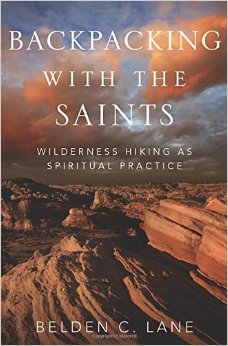 Backpacking with the Saints: Wilderness Hiking as a Spiritual Practice Beldon C. Lane (Oxford University Press) $24.95 I have written about this often, and there is no doubt that it is an outstanding, outstanding book, helping us all – campers, hikers, paddlers, wilderness adventurers or not – to appreciate how Biblical heroes and spiritual saints can be more deeply appreciated when read and pondered in the great outdoors. I haven’t done any hiking in years, I am sad to say, so I especially love the opportunity to do some vicarious adventuring along with my spiritual development. This is a really nice resource and a lovely book.
Backpacking with the Saints: Wilderness Hiking as a Spiritual Practice Beldon C. Lane (Oxford University Press) $24.95 I have written about this often, and there is no doubt that it is an outstanding, outstanding book, helping us all – campers, hikers, paddlers, wilderness adventurers or not – to appreciate how Biblical heroes and spiritual saints can be more deeply appreciated when read and pondered in the great outdoors. I haven’t done any hiking in years, I am sad to say, so I especially love the opportunity to do some vicarious adventuring along with my spiritual development. This is a really nice resource and a lovely book.
Beldon Lane written other remarkable books about the spirituality of geography, so to speak, about finding God amidst, as one book put it, “the solace of fierce landscapes.” But this one makes it even more obvious, linking, as it does, one particular saint’s writings with one particular outdoor adventure. Lane reads St. Columba of Iona while hiking in the Irish Wilderness, instance, and prays with Thomas Merton while in the Aravaipa Canyon and read Martin Luther while failing a climb of Mt. Whitney. There are more than a dozen chapters like this chapters like this, and each is like a short story, fascinating and thrilling and informative, about the landscape, the trip (sometimes, like the texts which accompanied him, which were risky) and the lessons learned while reading and reflecting on the teachings of spiritual writers, mystics, theologians and saints of all sorts.
Another bit of genius is how the book is arranged and the themes developed. The first section of readings in Backpacking with the Saints introduces us to spiritual writers who can help us start our journey, so he reads them at base camp, so to speak. He has a handful of chapters under each section, starting with the rubric of “Departure (Leaving the Trailhead)” and then some on the second leg, “Discipline (The Practice of the Wild)” followed by some on “Descent (When the Trail Gets Rough)” ending with some on the fourth leg of the journey, coming home, even – “Delight (Returning Home With Gifts.)”
What a fascinating way to develop our spiritual journey, and how intentionally he uses these profound religious writers as Sherpas, if you will, to accompany us on our own pilgrimages through life. For what it is worth, not all of the spiritual masters on this journey are Christian ones; he includes Gandhi, Rumi next to John of the Cross and Therese of Lisieux and Kierkegaard and Thomas Traherne and the like. Even though not all of the spiritual writers are Christ-centered, this is fascinating, helpful and surely one of the great books released this year!
BEST BOOK THAT COMBINES WILDERNESS ADVENTURE, OUTDOOR EDUCATION, SPIRITUAL FORMATION — RUNNER UP
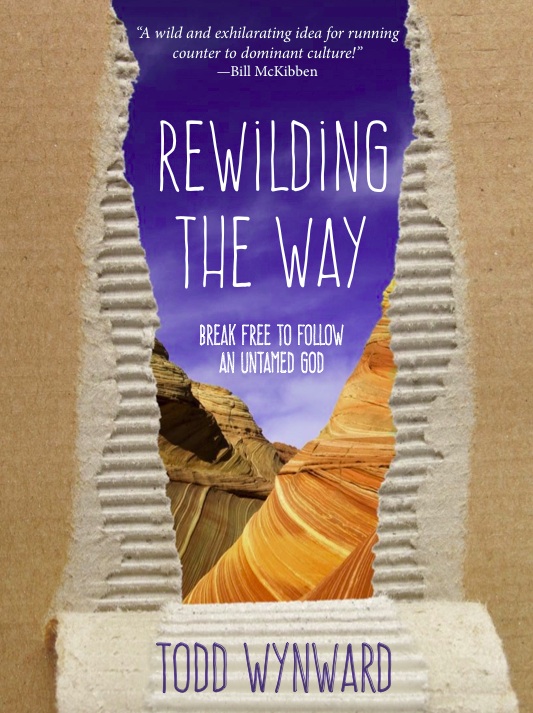 Rewilding the Way: Break Free to Follow an Untamed God Todd
Rewilding the Way: Break Free to Follow an Untamed God Todd
Wynward (Herald Press) $15.99
Okay, this is also a book about wilderness education, but its tone and direction are a bit different then the Beldon Lane one, above. I really loved it, too. I think to honor it now I have to explain a bit about it. Here’s what I wrote about it in BookNotes last September:
I have been eager to tell you about this
book, but had to read more of it, to be sure it was all I had hoped.
And it is! This is the story of a Mennonite couple – he, a wilderness
guide who has spent more than a thousand nights outdoors – who started a
very innovative wilderness-based public charter school in around Taos,
New Mexico, smack in the middle of the beauty of the Sangra De Christo
Mountains. Wynward’s call to “rewild” our understanding of the
Christian faith is provocative, challenging, and – for many of us, I’m
sure – will be a fresh reminder of the wild call to a joyful and
prophetic lifestyle.
He does some great Bible study in Rewilding the Way,
although it is upbeat and playful, even, as he pushes us to see that
Christian faith is less about certitude and dogma and more about
entering into God’s grace and living as loving agents of the restoration
of all things promised in the Biblical story. He knows some of the
original languages, and he offers some refreshing insights. His wanting
to be “wild” certainly pushes us to be creative and fun and energetic
(he’s an outdoors educator, after all, and has worked at camps and in
wilderness mission, so you get the picture!) I don’t fully trust, and
certainly don’t resonate with, many of the hipster post-evangelicals
these days telling us to be wild and raw and free and crazy, written,
too often, I suspect, from the safety of their coffee shop and little
house church full of their best friends. Some talk about being “wild” but have little serious insight about what that entails.
But
Wynward rescues dying refugees in the dangerous desert, aligns himself
with Christians doing civil disobedience in the face of what they
believe is a repressive Empire, and gives away stuff he doesn’t need, in
joyful response to the Biblical vision of abundance and agape and
radical mercy. He makes a wondrous adventure out of experiential
education and studies stuff like watersheds and bio-regions and the
local repercussions of climate change. You want to be wild at heart?
This rejection of the culture’s assumptions of the “good life” and what
is plausible as new creation opportunities as we follow the Jesus Way
into the wildernesses, is a great, great resource to stimulate your
imagination. I dare ya.
For
some of us, we can recall the first time we read Dorothy Day or heard
the stories of Oscar Romero or really took seriously the words of John
Perkins. Maybe it came from early articles in 1970’s era Sojourners or maybe it came recently from the Irresistible Revolution or the Common Prayer prayer
book by Shane Claiborne and his joyful crew of urban activists. I
haven’t felt the upbeat energy of that wholistic and joyful vision of
radical social change in quite a while (even though I read the new
monastics and other such books routinely.) This book just offered some
truly exciting stuff and it helped these tired bones to enjoy these
pages. Todd Wynward has brought together some remarkable characters,
friends and mentors of his, has read and engaged some fabulous authors,
and helps us all learn from those who are “recovering from affluenza and
restoring a humble place in the community of creation.”
Endorsements for Rewilding the Way
include Chad Meyers, Mark Scandrette, Nancy Sleeth, Bill McKibben and
(former Dallastownian) Rick Ufford-Chase. New Mexican Franciscan Richard
Rohr — whose center in Albuquerque brings together contemplation and
activism — shows up, as you might guess. The back cover says Wynward
seeks “the feral foundations of Scripture.” You gotta love a phrase like
that. Especially written by guy who lives in a yurt.
Brian McLaren says “I read a lot of good books. But seldom have I read a book that inspired me as much as Rewilding the Way. It is important, meaningful – and so beautifully written.”
I’m
not as much of an outdoors guy as I sort of wish, and whether you
really are or not, I think Todd Wynward’s new book, with its great
images and metaphors (and beautiful, provocative cover design) is a
joy. I recommend this, and offer kudos to Herald Press for doing such
daring work. The middle portion of the book, by the way, offers succinct
ideas, “Seven Paths to Wilding Your Way” which makes it practical (if
challenging) and do-able.
I’m
not gonna lie: Beth and I are not going to very fully take up the
watershed discipleship that he describes here, but I was energized by
the stories, inspired by his honest struggles, and cheered by the
reminder of what it really looks like to affirm our proper place in
God’s good creation as we fight to protect the great outdoors. Three
cheers for this feral book!
And three cheers for that great cover, too! Way to go Mennonite Publishing!
BEST EXAMPLE OF THEOLOGY IN CONVERSATION WITH URGENT CONTEMPORARY CONCERNS
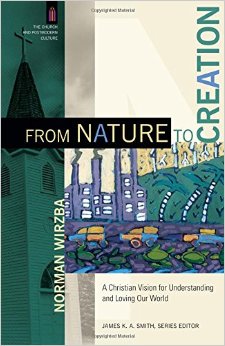 From Nature to Creation: A Christian Vision for Understanding Our World Norman Wirzba (Baker Academic) $19.99 This book deserves accolades for a number of reasons, and is significant on a number of fronts. First, I should remind you that it is the most recent (and maybe the last) in the long series of books edited by James K.A. Smith called “The Church and Postmodern Culture.” Launched by Smith’s own wonderful first one, Whose Afraid of Postmodernism. These are fascinating examples of serious Christian scholars interacting with European philosophers like Derrida and the like. The whole series attempts to use our theological resources to help us grapple with the critique made by these deconstructionists, rather then merely disagree with them, or avoid their hard-hitting social criticisms. So kudos to Smith and the authors he’s worked with to create this set of books.
From Nature to Creation: A Christian Vision for Understanding Our World Norman Wirzba (Baker Academic) $19.99 This book deserves accolades for a number of reasons, and is significant on a number of fronts. First, I should remind you that it is the most recent (and maybe the last) in the long series of books edited by James K.A. Smith called “The Church and Postmodern Culture.” Launched by Smith’s own wonderful first one, Whose Afraid of Postmodernism. These are fascinating examples of serious Christian scholars interacting with European philosophers like Derrida and the like. The whole series attempts to use our theological resources to help us grapple with the critique made by these deconstructionists, rather then merely disagree with them, or avoid their hard-hitting social criticisms. So kudos to Smith and the authors he’s worked with to create this set of books.
Secondly, I might note that perhaps of all the books, the Wirzba one shows us why it all matters. He is less a philosopher interested in pomo scholarship, it seems, and a bit more down-to-Earth, a phrase I use intentionally. Wirzba’s other books, some pretty academic, are about agriculture, about sustainability, about bio-regions and watersheds. He has written about and with his friend Wendell Berry and currently teaches theology and ecology at Duke Divinity School. His lovely, lovey book Making Peace with the Land is co-written with a small farmer; they both make us hungry by writing about a Christian view of food, and they make us want to join them in coming to church with gardening dirt under our fingernails. That’s the kind of scholar/practitioner her is.
Yet, Professor Wirzba is quite capable of taking his place in this series about postmodern culture and does some heavy lifting for us here analyzing how Western culture’s understanding of our home as God’s creation shifted to “nature” with the rise of modernity. He documents the philosophers, gives us a little bit of genealogy of ideas to get at this propitious shift in rhetoric and imagination. Of course he brings the postmodern guys to bear on this with a few footnotes from Heidegger and Foucault and the like. He helps us with insightful analysis: as Union Theological Seminary prof Larry Rasmussen writes,
As commercialized nature and utilitarian thinking poison the planet and change the climate, what could be more important than ‘creation’ as the gracious way we live. No one is better than Wirzba in describing modernity’s idolatrous and disastrous course and offering a Christian understanding of creation as the antidote.
So, this is another book in this important series. And it really does help us understand how these shifts underneath the roots of Western culture have had disastrous consequences. (Ahh, I kept thinking as I read some of this: whoever thinks history and philosophy are only for “ivory tower” idealists or nerdy intellectuals with their head in the clouds or the books should be shown this, noting, again, how ideas have consequences and how social imaginations, often grounded in rhetorical and intellectual shifts, push us to practices and habits and ways of arranging our lives and our societies. If we want to — literally, as Wirzba shows — eat better, knowing how we have rejected our very creatureliness is part of the answer.
Lastly, we award this book in a season when there is heighten interest in faith-based understandings of food and farming, spending time intentionally buying and preparing food and eating well. And there is an increased desire to see how our deepest spiritual experiences can be enhanced by our awareness of God’s presence in the ordinary things of daily life. With Norman Wirzba’s contribution here about the creation being the world in which God delights — less plausible when we’ve reduced creation to mere nature — we ourselves can be open to delight, and to encountering the God of the Bible who invites us to delight.
One of the grandfathers of contemporary Christian environmental activism (now called creation-care) is Loren Wilkinson who teaches at Regent College in Vancouver. His own endorsing blurb on the back of From Nature to Creation is a good reminder, especially when he ends by saying, “Drawing with magisterial and eloquent scholarship on a vast range of sources across both Christian and secular thought, Wirzba calls us to attentiveness, to rootedness — and above all, to gratitude.” Such a book surely has to be commended, and we are happy to name it one of the most important of the year! Perhaps, as Steven Bouma-Prediger (For the Beauty of the Earth) says, reading it will not only help us better love God and embrace our own creaturelines, but that doing so will be “life-giving for all of God’s creatures.” We can hope.
BEST EXAMPLE OF A CHURCH STATEMENT IN CONVERSATION WITH CONTEMPORARY CONCERNS
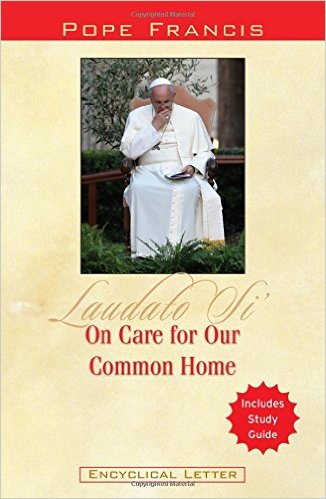 On Care of Our Common Home (Laudato Si) Pope Francis (Word Among Us Press) $12.95 I suppose you know about Encyclical Letters, the rare and formal times a Pope offers to his Roman Catholic flock and the listening world a declaration of what he takes to be God’s will, Christian truth for the church and for the cultures of the world. Much has been made of Pope Francis’ radical ways — that he took the namesake of the old Saint Francis of Assisi is important — and his own former ministry among the poor in his native South America influenced him significantly.
On Care of Our Common Home (Laudato Si) Pope Francis (Word Among Us Press) $12.95 I suppose you know about Encyclical Letters, the rare and formal times a Pope offers to his Roman Catholic flock and the listening world a declaration of what he takes to be God’s will, Christian truth for the church and for the cultures of the world. Much has been made of Pope Francis’ radical ways — that he took the namesake of the old Saint Francis of Assisi is important — and his own former ministry among the poor in his native South America influenced him significantly.
Not everyone knew, at least until this document, that besides being a priest among the poor he also has an advanced degree in the sciences, and is a thoughtful, if not professional, political philosopher as well. Nearly anyone who reads this remarkably important Papal Encyclical will quickly realize both. He is a great preacher and gentle spiritual writer and many of his devotional books have come out in the last year or so (including a major new one that just came out this week!) This important formal piece, though, that was released this past summer, is exceedingly important, and exceptionally astute.
Two quick comments: Laudato Si: On Care for Our Common Home places the Christian concern about climate change in the theological context of our human duty to care for God’s creation; it keeps God in the discussion at all points. (Indeed, the Latin phrase in the title means “Praise Be to You!”) I suppose Francsis hasn’t read the Norman Wirzba bo
ok mentioned above although both that book and the Pope’s own intellectual influences would agree: secularizing modernity effected both how we view God and thereby how we view the cosmos and therefore the way we fall into idolatry, such as reducing progress to mere economic growth. Once we realize God’s great delight in God’s own world that He so loves, we ourselves can see our own vocation of creation care as a divinely charged obligation and privilege. So Laudato Si is good creational theology rooted in a history of ideas, and analysis of the complexity of human cultures and a good example of thoughtful Catholic scholarship regarding economics and markets, politics and governments, various institutions and civic life, global cooperation. and the need to work hard at naming and working towards an ethic of the common good.
For an exceptional bit of Protestant appreciation of and evaluation of the Pope’s Letter, see the wonderful two part piece by Jonathan Chaplin in Comment magazine, here and here. After reading this detailed review you will want to get the Encyclical itself. How great that in 2015, a Catholic Pope can write a detailed analysis of God’s role in the world, the dangers of climate change, and the inadequacies of science and markets alone to solve our cultural malaise, in such a way that it ends up being discussed, even with its Latin title, in the secular Western media as well as among Christian folks of all sorts. This really is a little miracle, and we are grateful to play a part, selling copies here, and commending it to you as a very important, mature bit of Christian writing. I say Gratias Deo.
THE ANNUAL LEONARD SWEET AWARD?
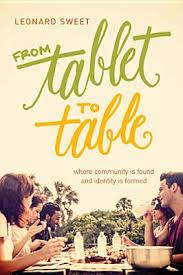 From Tablet to Table: Where Community is Formed and Identity is Formed Leonard Sweet (NavPress) $14.99 I offer this award somewhat tongue in cheek – Sweet really has the capacity to read volumes and volumes (ancient spiritual saints, contemporary postmodern theorist, the latest cultural critics and preachers) and draw on their most pithy lines and insights as he weaves his own books, some big and significant, some more moderate in size and ambition. He has released nearly a book a year for a decade now, or so it seems -it’s hard to keep up – and most have been delightful, curious, interesting, informative, inspiring. Last year he did a nearly magisterial book on preaching (cleverly entitled Giving Blood) and, I’m glad to report, this year’s book is a short, slim one. I’d be resentful if he did two huge, demanding volumes back to back.
From Tablet to Table: Where Community is Formed and Identity is Formed Leonard Sweet (NavPress) $14.99 I offer this award somewhat tongue in cheek – Sweet really has the capacity to read volumes and volumes (ancient spiritual saints, contemporary postmodern theorist, the latest cultural critics and preachers) and draw on their most pithy lines and insights as he weaves his own books, some big and significant, some more moderate in size and ambition. He has released nearly a book a year for a decade now, or so it seems -it’s hard to keep up – and most have been delightful, curious, interesting, informative, inspiring. Last year he did a nearly magisterial book on preaching (cleverly entitled Giving Blood) and, I’m glad to report, this year’s book is a short, slim one. I’d be resentful if he did two huge, demanding volumes back to back.
I loved this new one, and thank him for a dozen things it invited me to ponder, to consider, to learn. (Including introducing me to the TV show Blue Bloods which, he noted, is one of the few shows these days where a family meal is a routine part of the show!) I suppose that this reminder of the joy of eating, the importance of relationships formed around the table, and the richness of the sacramental tradition which discerns God’s presence in the ordinary things of life in the good creation and the reminder that we form our identity within safe communities, will not be utterly new to most readers, but it is a splendid reminder, a beautiful and energetic call to this sense of the good life. New for you or not, you will be thrilled to see how Sweet weaves together the stories, the quotes, the images and metaphors, the Bible teaching and the reading of social trends and demographics and offers them in a delightful, work. From Tablet to Table is quintessentially Sweet, sweet and wise and feisty and good and endlessly thought-provoking. It is short and the colorful cover inviting, but do not be fooled: this is a very important book.
You might want to know that I was going to playfully call this Hearts & Minds honor the “I Told You So” Award because I have, surely somewhere in the last 20 years, noted that I thought Len’s emphasis on computers and screens and whiz-bang technology was a tad overstated. I am no Luddite, but our own cultivated ineptitude here on line is in part a matter of principle: we have tried to stay, as he once put it, “high touch” without his equally important second part: “high tech.” Faceless carts and technological bureaucracy takes the humanity out of our shopping transactions, and I don’t think that is normative for life in God’s world. Years ago we took to heart the concerns of the likes of Jacques Ellul and, say, Technopoly by Neil Postman, hoping to resist the habits that come with an over-reliance on fast, faceless technologies. I recall more than one conversation with Dr. Sweet about this very thing, pressing him to show some distance between us and the gizmos and I continue to fret about how we might be careful regarding what Quentin Schultze has called “the habits of the high tech heart.” I want to maintain a regular refocus, as Sweet so nicely puts it, from the tablet to the table.
For Sweet, an early adopter of every high tech gadget known to postmodern man and zealous advocate for faith communities to embrace them, it may seem nearly ironic to have him warn us now about the unexpected consequences of too much tablet time, too much screen life.
Alas, it only seems ironic, because, at his heart, Len is a Victorian. He collects antiques for God’s sake. He uses screens but he loves books. He appreciates the relational life, dines well, I suspect, relishes conversations about aesthetics, wrote about being green before it was fashionable. In a way, this isn’t ironic, it is Sweet coming full circle, as he does, for those with the eyes to see, in nearly all his many books. We don’t need to get rid of our tablets and iphones to appreciate good meals, or to find God at the table. But we may need to look up from time to time, get our hands dirty in a backyard garden and enjoy not just poking around on our devices, but doing the dishes, joyfully cleaning up the mess of a life lived well in the real world. From Tablets to Tables will remind us, inspire us, help us and if we do as he suggests, it will form us, shaping us in healthy ways. Get it today -and not an ebook, either! This little gem you’ll want to hold and savor, share and discuss, hopefully around a real table full of good food.
BEST BOOK OF POETRY
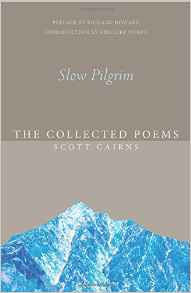 Slow Pilgrim: Collected Poems Scott Cairns (Paraclete Press) $39.00 I will admit to this right up front. I don’t know much about poetry, and, frankly, go through phases, long phases, where I don’t pay much attention to these glorious gifts of word play and verse. (I do pay attention to well-written song lyrics, but that is, admittedly, a different art.) Every now and then, though, I relish a certain poetic work, discover a certain poet, and I pay more attention. Are you maybe like that? Few Americans buy much poetry, and although we have a unique selection here, we don’t sell much poetry at all.
Slow Pilgrim: Collected Poems Scott Cairns (Paraclete Press) $39.00 I will admit to this right up front. I don’t know much about poetry, and, frankly, go through phases, long phases, where I don’t pay much attention to these glorious gifts of word play and verse. (I do pay attention to well-written song lyrics, but that is, admittedly, a different art.) Every now and then, though, I relish a certain poetic work, discover a certain poet, and I pay more attention. Are you maybe like that? Few Americans buy much poetry, and although we have a unique selection here, we don’t sell much poetry at all.
Which is why, I suppose, I really want to honor this extraordinary writer, a good man, an excellent essayist, memoirist, scholar, and spiritual companion for those exploring the mysteries of the Orthodox tradition. Cairnes is beloved in classy circles such as those who follow Image Journal and has often appeared at good venues like the Calvin College Festival of Faith and Writing or the Buechner Institute at King University in Bristol, Tennessee. This new book is a major release, a gathered collection of his poems, and it is a handsomely produced paperback (as we have come to expect from the rich heritage of printing from the religious community that runs Paraclete Press.) There is a nice forward by Gregory Wolfe.
If you buy a lot of poetry and serious literature, I do not have to convince you of why Cairns is a treasure in the American world of letters. If you follow the conversations about spirituality and the arts, you know his work and value his presence in the landscape. But if you don’t buy a lot of poetry, I hope you might consider joining us in honoring the poet, buying this book, pondering and then sharing some of its beautiful, allusive, graceful, vital lines. Of all the poetry releases this year, of all the artful books we received, Slow Pilgrim is not just a notable book to own, but one of the best books of 2015.
BEST CHRISTIAN BOOK ABOUT POETRY
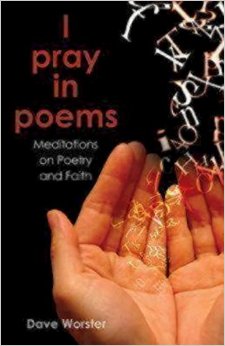 I Pray in Poems: Meditations on Poetry and Faith Dave Worster (Morehosue Publishing) $16.00 Did you resonate with what I wrote about, that some of us just don’t pay enough attention to poetry? This book may be for you. (Of course, if you are already a poetry lover, then this book will thrill you to no end.)
I Pray in Poems: Meditations on Poetry and Faith Dave Worster (Morehosue Publishing) $16.00 Did you resonate with what I wrote about, that some of us just don’t pay enough attention to poetry? This book may be for you. (Of course, if you are already a poetry lover, then this book will thrill you to no end.)
The format is simple. After an introductory chapter or two, there are about 10 entries, each on a different poem, for the church seasons of Advent, Christmas and Epiphany. Then there are 10 more suitable for Ash Wednesday, Lent, Holy Week and through Easter. In this sense, I Pray in Poems is almost like a devotional, or a resource for faith formation or preaching during these parts of the church calendar. But there is more here then simple inspirational devotionals inspired by nice lines from 20 different poems. It really is a careful, detailed study, opening up the poetry, and in so doing, opening up our hearts.
Listen to what Stanley Hauerwas writes,
Prayer requires close attention to details. Poetry, at least the poetry that Dave Worster helps us read, trans us to attend to details not the least being words. So Worster’s contention that there is an essential connection between poetry and prayer is sustained throughout this marvelous book. Drawing on the wisdom gained from years of teaching poetry, Worster enlivens our lives as Christians by helping us see what we otherwise might miss in our hurry to get on with life. By slowing us down we are able to see with his expositions of these poems that God is in the details.
BEST ART BOOK
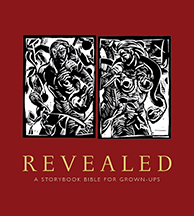 Revealed: A Picture Bible for Grown Ups edited and compiled by Ned Bustard (Square Halo Books) $37.99 You may want to know that this was one of our biggest sellers this last quarter; it was released a week and half before Christmas, an artful Bible-lover reviewed it briefly in the serious journal First Things, and the next thing you know we were shipping this handsome, provocative, coffee table picture Bible all over the country. And overseas! What fun.
Revealed: A Picture Bible for Grown Ups edited and compiled by Ned Bustard (Square Halo Books) $37.99 You may want to know that this was one of our biggest sellers this last quarter; it was released a week and half before Christmas, an artful Bible-lover reviewed it briefly in the serious journal First Things, and the next thing you know we were shipping this handsome, provocative, coffee table picture Bible all over the country. And overseas! What fun.
I could write more about Bustard’s interesting and usually helpful commentary on the Bible passages and his very interesting and always helpful commentary on the art. I could tell you which pieces I think were brilliant, which were most striking, which were appropriately repulsive. We could talk about sex and violence in the Bible and the graphic nature of the visual arts in God’s world. We could talk about the large backstory of Bustard’s determination to bring ancient and modern woodcuts and lithographs and other black and white artwork side by side to illuminate and provoke us to see the Biblical texts more clearly. We could talk about which artists do this best, which are too allusive or too bold. We could talk about the fascinating relationship of word and image, and how good art that is tied to narrative is perhaps different than other kinds of art. We could even talk about Ned’s good friend -Square Halo was the first to publish him — Makoto Fujimura’s luminous, lavish illustrated Four Gospels and how his abstract art in a different way opens up our vision of the text and the gospel behind it. Revealed is a very different sort of art piece, truly a “picture Bible.”
Revealed: A Picture Bible for Grown Ups is surely one of the most interesting books of this yearn of our Lord, an amazing contribution to not only Biblical studies but to the world of Christian art. I think to honor it here I will invite you to check out the review I did last month, here.
MISSION STORIES
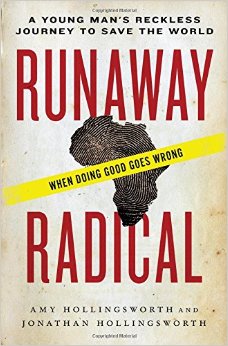 Runaway Radical: A Young Man’s Reckless Journey to Save the World Amy & Jonathan Hollingsworth (Nelson) $15.99 I was going to list this as one of my favorite memoirs of the year, a back and forth tale told by a young adult committed to radical faith and serious visions of making a difference the world and his conventionally Christian mother, watching as the son’s deep faith becomes extreme, driven, weird, even, and as he ends up in Africa serving in a mission compound and is shamed and abused as toxic religionists there add to his bondage and confusion. What a fascinating, relevant, and heartbreaking story, a story of young adult faith development, of the dangers of religious zeal, of the confusions about what Steve Garber calls “proximate justice” – that is, that we in a fallen world need to learn to live with something other than the very best and full, proper realization of God’s will. You can’t always get what you want, the old rock song reminds us, but some young radicals miss this, and filled with idealism and a thin view of the tragic, end up bruised and broken. This was the hard experience of Jonathan Hollingsworth and in Runaway Radical his story is told mostly through the eyes of his mother.
Runaway Radical: A Young Man’s Reckless Journey to Save the World Amy & Jonathan Hollingsworth (Nelson) $15.99 I was going to list this as one of my favorite memoirs of the year, a back and forth tale told by a young adult committed to radical faith and serious visions of making a difference the world and his conventionally Christian mother, watching as the son’s deep faith becomes extreme, driven, weird, even, and as he ends up in Africa serving in a mission compound and is shamed and abused as toxic religionists there add to his bondage and confusion. What a fascinating, relevant, and heartbreaking story, a story of young adult faith development, of the dangers of religious zeal, of the confusions about what Steve Garber calls “proximate justice” – that is, that we in a fallen world need to learn to live with something other than the very best and full, proper realization of God’s will. You can’t always get what you want, the old rock song reminds us, but some young radicals miss this, and filled with idealism and a thin view of the tragic, end up bruised and broken. This was the hard experience of Jonathan Hollingsworth and in Runaway Radical his story is told mostly through the eyes of his mother.
As I explained in a long review of this captivating book last winter, I could hardly put it down and I zipped through it relentlessly. It made me laugh, made me scratch my head, made me nod in recognition, made me ponder anew things I hold dear, and made me glad that the season of trouble foisted on this good young man didn’t drive him from faith altogether. By the end of the book – spoiler alert – dear Jonathan is less sure of many things, but seems quite sure of one thing: God is a God of grace, of goodness, of mercy, so it is okay to not have life all figured out. It is okay to doubt, to question. God is with us and for us, no matter how screwy the church may be. And that is a very important thing to know.
Runaway Radical works on many levels, the story of the boy, the struggles and concerns and viewpoints of the mother and father at home, the expose of weird faith in a local charismatic mega-church and even weirder and more corrupt faith as practiced in central Africa where his plan to change the world got derailed. It is a window into contemporary evangelical faith and a window into how, finally, God’s grace can give new hope and renewal after very hurtful experiences. I love the voice of the mother and of the son, and glad for their willingness to be so vulnerable in telling their story. Call it a great memoir, an important missionary story, a cautionary tale. Call it one of the best of 2015.
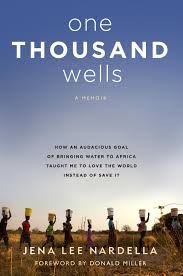 One Thousand Wells: How An Audacious Goal Taught me to Love the World Instead of Save It Jena Lee Nardella (Howard) $24.00 Again, I want to celebrate this fabulous book, one that I exclaimed about as I was reading it, and wrote about the day I was finished with it. Jena Lee Nardella is a brave soul, a social entrepreneur who has worked with the very cool band Jars of Clay as they endeavored with her help to start an innovative wholistic mission project providing clean water and educating about clean blood, to help alleviate disease in Africa. It is important stuff, but enjoyable: IJM President Gary Haugen says it is “a delightful read.”
One Thousand Wells: How An Audacious Goal Taught me to Love the World Instead of Save It Jena Lee Nardella (Howard) $24.00 Again, I want to celebrate this fabulous book, one that I exclaimed about as I was reading it, and wrote about the day I was finished with it. Jena Lee Nardella is a brave soul, a social entrepreneur who has worked with the very cool band Jars of Clay as they endeavored with her help to start an innovative wholistic mission project providing clean water and educating about clean blood, to help alleviate disease in Africa. It is important stuff, but enjoyable: IJM President Gary Haugen says it is “a delightful read.”
Significant thinkers about global development and third world justice such as Dr. Paul Farmer inspired the young idealist in her college years. As she met author Steve Garber (who in those years had written a life-changing book about “weaving together belief and behavior in the young adult years” called Fabric of Faithfulness) she came to know the guys in Jars. Garber helped them connect, inspired them all to keep on keeping on, and this book tells the fascinating, inspiring, complicated, heart-rending history of the rise of the extraordinary project known as Blood: Water Mission. Leverage the fame of a hip Christian rock band to raise money to dig a thousand wells, in utter cooperation with local African leaders? Build trusting partnerships between artists and fans and politicos and development specialists and local African villagers, women’s groups, medical clinics, indigenous churches? How does a girl in college do all this?
As I said in my BookNotes rave review, there are many books about idealistic social entrepreneurs, about wholistic mission, stories of success and failure in honoring God by loving our global neighbors well. Some are mostly uplifting stories, a few are tedious accounts of the economic data and possibilities of solving issues related to global poverty. One Thousand Wells seems to do it all, telling a great story -set both in the states, traveling on tour with the band, raising money on college campuses and such – and offering true insights about her times in Africa, learning about the nature of global poverty, the significance of fighting HIV AIDS and the role of clean water in the effort to nurture public health. From hanging out with evangelical leaders like Garber to meeting rock stars and world leaders, Jena has experienced much. But true to her good heart and solid perspective, the book shines most when she tells of her friendships – some healthy and enduring, some tragically broken – with leaders, mostly women, in Africa. (I’m not usually a fan of color photographs in books, but in One Thousand Wells they were fantastic to see!) A good part of Jena’s heart resides in that glorious, large land, and the physical and cultural landscapes are introduced with wonder and beauty. This is a truly lovely book, a great story, by a serious young writer and activist. We are delighted to name it as one of Hearts & Minds Best Books of 2015.
BEST ACADEMIC BOOK OF 2015
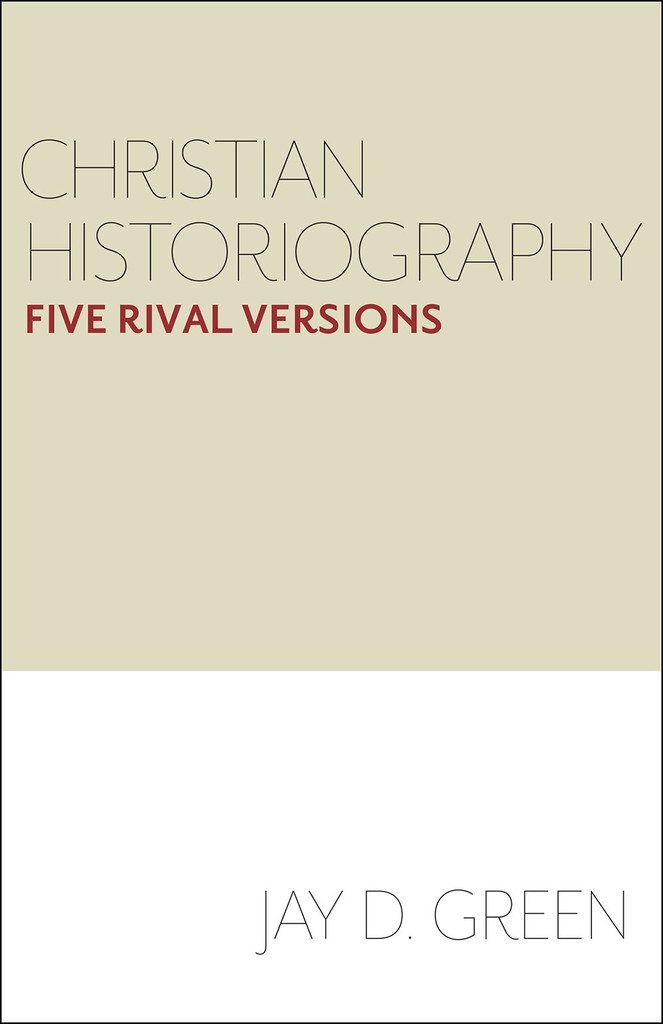 Christian Historiography: Five Rival Views Jay Green (Baylor University Press) $34.95 We are not an academic bookstore, really, and although we carry some scholarly and university press titles, we are a little picky – some say not nearly enough – about the sort of scholarly books we promote in various academic fields. It is a looming question, even in a world where “all truth is God’s truth” and in common grace there is so much to be appreciated and learned: what philosophical underpinnings shape the popular notions of various scholarly fields, or various camps within those fields, and of the particular scholars within those disciplines? How do we bring God’s health and wisdom and Biblically-informed insight to academic discourse, genre by genre, department by department of the modern university? From the details of neurological science or trauma studies to the insights of literary criticism or film studies, from the data found in sociology to the latest studies about climate change, from the debates about theories of jurisprudence to the complexities of aesthetics or architecture, it should be evident that no academic sphere is philosophically neutral, that no scholarship is religiously disinterested, that every scholar believes in something that informs her work. All theories are grounded in the longings and ultimate concerns of the human heart and therefore, seeking to discern the contours of the influences in each field is a major concern for Christian scholars in the academy. It should be obvious, but it usually isn’t, that this is the very calling of Christian academics, and their students, but for thinking Christians in the world at large, it is no less of a necessity; how do we discern the wisdom and truthfulness of the ideas coming at us from presidential candidates, popular science magazines, or between the lines in popular entertainment and advertising? We are always looking for books that thoughtfully engage the foundational theories in any given field, that discern the assumptions and religious-like values that shape the development of those fields, and help us all figure how to, as some put it, develop a uniquely Christian viewpoint as we “integrate faith and learning.”
Christian Historiography: Five Rival Views Jay Green (Baylor University Press) $34.95 We are not an academic bookstore, really, and although we carry some scholarly and university press titles, we are a little picky – some say not nearly enough – about the sort of scholarly books we promote in various academic fields. It is a looming question, even in a world where “all truth is God’s truth” and in common grace there is so much to be appreciated and learned: what philosophical underpinnings shape the popular notions of various scholarly fields, or various camps within those fields, and of the particular scholars within those disciplines? How do we bring God’s health and wisdom and Biblically-informed insight to academic discourse, genre by genre, department by department of the modern university? From the details of neurological science or trauma studies to the insights of literary criticism or film studies, from the data found in sociology to the latest studies about climate change, from the debates about theories of jurisprudence to the complexities of aesthetics or architecture, it should be evident that no academic sphere is philosophically neutral, that no scholarship is religiously disinterested, that every scholar believes in something that informs her work. All theories are grounded in the longings and ultimate concerns of the human heart and therefore, seeking to discern the contours of the influences in each field is a major concern for Christian scholars in the academy. It should be obvious, but it usually isn’t, that this is the very calling of Christian academics, and their students, but for thinking Christians in the world at large, it is no less of a necessity; how do we discern the wisdom and truthfulness of the ideas coming at us from presidential candidates, popular science magazines, or between the lines in popular entertainment and advertising? We are always looking for books that thoughtfully engage the foundational theories in any given field, that discern the assumptions and religious-like values that shape the development of those fields, and help us all figure how to, as some put it, develop a uniquely Christian viewpoint as we “integrate faith and learning.”
Sorry to go on about the background of what I mean by this award, and why we value a book like Dr. Jay Greens. It is a fine work, a perfect example of this very sort of research, and a wonderful book to hold up as exemplary in the field of Christian scholarship.
Except, he has gone a step deeper into the conversation: these five rival views discussed in his new book are all alleged Christian views of the topic. These authors have been aware of the various schools of thought within their discipline, and have been more or less been intentional about carving out a certain school of thought – a camp or school of historiography – that they believe comports with their Christian convictions. Can they all be right?
As you can tell, the particular field here is history, and the questions Green asks are about these rival theories of the philosophy of history as they are appropriated by Christian colleagues within the discipline. Nobody interprets anything in a vacuum, and it is certainly obvious that presuppositions and a priori concerns and values and attitudes and convictions shape what sort of history we study, and what we make of it all. The study of these theories behind and underneath the doing of the work of writing history – historiography – is on display here, each view or school of thought fairly described and explored, and evaluated in light of the author’s own biases about his own understanding of a faithful, coherent view of Christian historiography.
Again: no academic discipline is philosophically neutral, so there are different schools of thoughts within each and every academic field. Christians are called to “take every thought captive” and allow their faith and assumptions about realty to color the work they do in the academy. These authors discussed in this Five Rival Views book are all attempting to do this. It is Green’s project to describe and compare and contrast and evaluate the coherence and Christian coherence of these different authors. Are they actually doing consistently Christian historiography in their methods and visions and values?
I trust this solid, exemplary thinker – he teaches at Covenant College in Tennessee and is working in the grand Augustinian/Reformed tradition – and appreciated his role in a splendid reader compiled a few years ago about these very things. (Published by University of Notre Dame Press, it was called Confessing History: Explorations in Christian Faith and the Historian’s Vocation and was co-authored by other thoughtful Christian historians and friends John Fea of Messiah College and Eric Miller of Geneva College.)
This new volume from Baylor University Press is a major project, truly one of the finest works of this sort ever done. Would that there would be a book like this in every field of scholarship! I know it isn’t much from our corner of the world here in small town Dallastown, but we want to celebrate this kind of work, thank Dr. Green for his conscientiousness as a Christian scholar, and honor this book as one of the most significant of 2015.
A SHAMEFUL AWARD: BEST BET FOR BEST BOOK OF 2015 THAT I’VE NOT (YET) READ
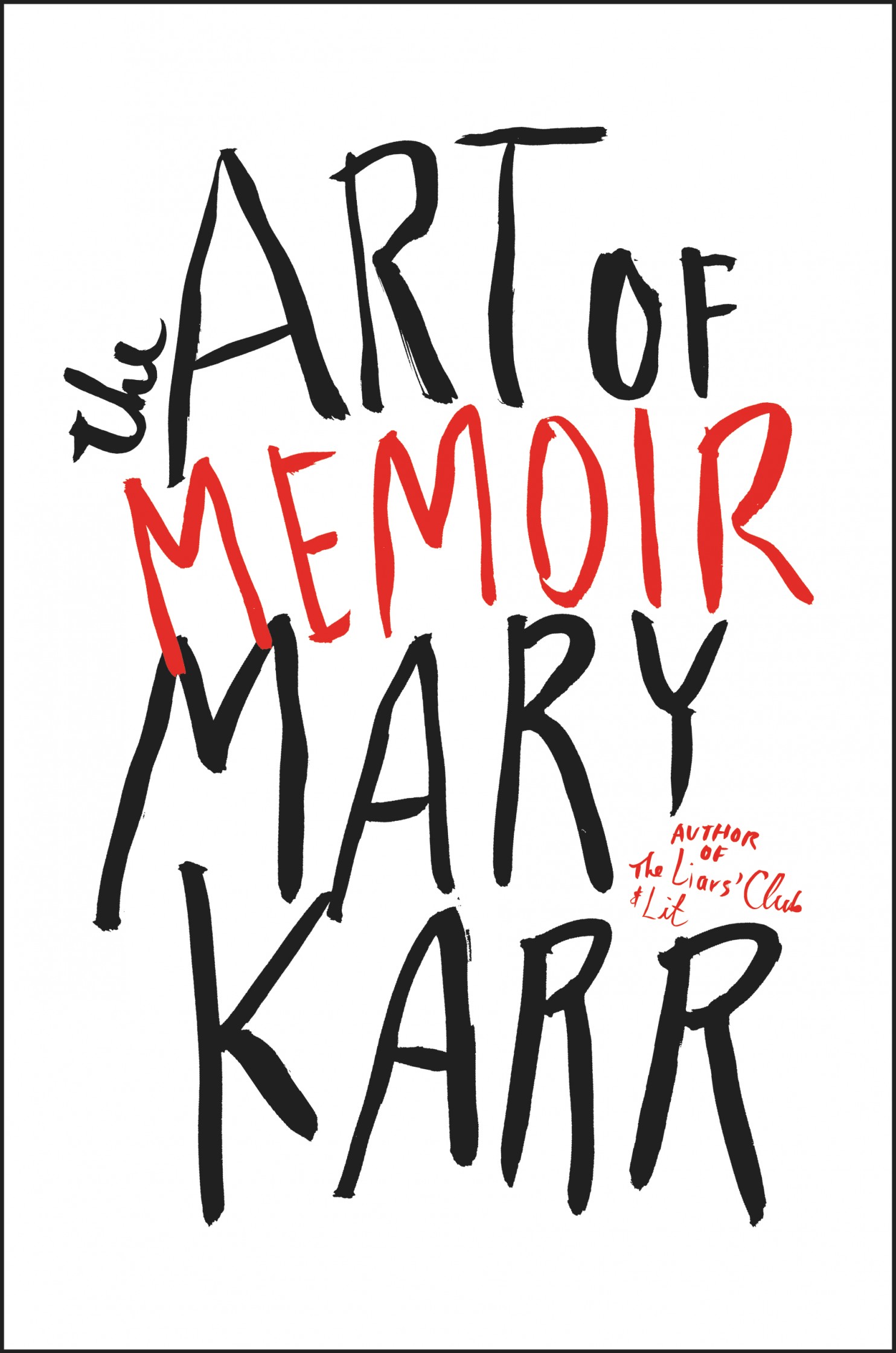 The Art of Memoir Mary Karr (Harper) $24.99 Yes, I’m ashamed I haven’t read more than a page or two of this, but I’m honoring it here anyway.
The Art of Memoir Mary Karr (Harper) $24.99 Yes, I’m ashamed I haven’t read more than a page or two of this, but I’m honoring it here anyway.
There are some books that promise to be so enticing, so good, so fun, that I have to be in a suitable mood that is up for such joy. Or a book seems to be so important and serious and momentous that I have to be ready to dedicate the time and energy for that kind of reading. I am itching to pick it up, but know the time just isn’t right. Ms Karr’s recent book may be a little of the later, but is mostly the former, and I can’t believe I just haven’t found the space to take it up yet. I read the preface and the first few pages and laughed right out loud. I saw her list of great memoirs in the back and was floored. But I really, really want to be in the right frame of mind to enjoy it best. I thought how I might just go through her own story again, picking up The Liars Club, Cherry, and Lit all over again. And I wondered what the gritty and eccentric Ms Karr thinks of some of my favorite memoir writers, such as Catherine Gildiner (we so loved her three volumes about her quirky life) or my favorite memoirs such as Reading the Mountains of Home by John Elder, The Tender Land by Kathleen Finneran, The Cliff Walk: A Memoir of a Job Lost and a Life Found by Don Snyder and the devastating An American Requiem: God, My Father, and the War That Came Between Us by James Carroll. Anyway, I am sure The Art of Memoir will be fabulous for anyone who likes Carr, or who likes books about books. I can’t wait. I’m naming it one of the best books of 2015. Even though I haven’t read it yet.
BEST NEW PUBLISHER
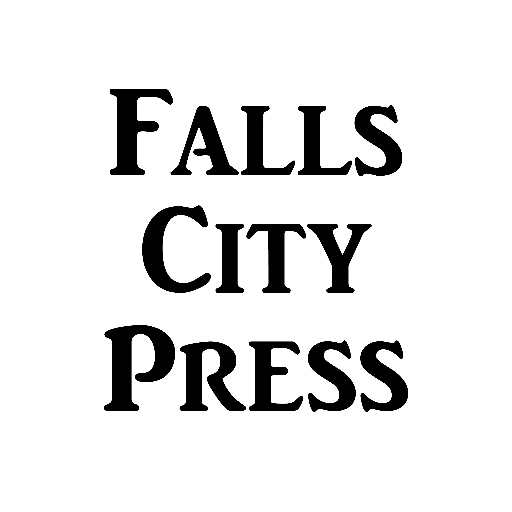 Falls City Press, founded 2015.
Falls City Press, founded 2015.
I will admit that I don’t know any new publishers this year, and so I can’t exactly promose the final veracity of this award. But my good freind Keith Martel — one of the sharpest guys I know, in so many ways — started what he is calling a micro-press. I guess like a micro-brew. He’s developing a plan to release other books, but has done two good ones before his first year anniversary is even upon him. First he did his own co-authored book, one which I have raved about more than once, Storied Leadership: Foundations of Leadership from a Christian Perspective written with his pal and colleague at Geneva College, the always enthusiastic Brian Jensen (Falls City Press; $18.00.) These two 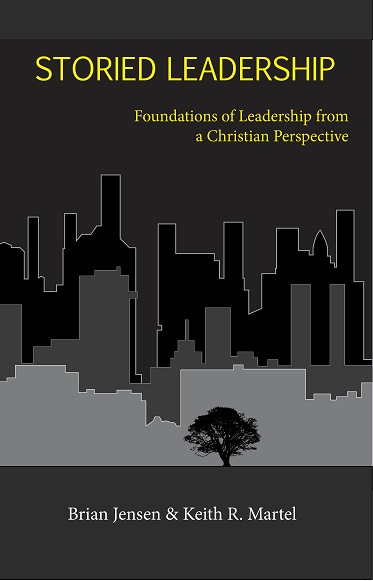 good are rock solid in faith and perspective, philosophical without being arcane, and serious without being dry. So they’ve gotten this whole-life discipleship thing just right: God cares about all of life and we are invited to take up our role as ambassadors of CHrist’s Kingdom, exploring normatively in all aspects of life. So when they write about leadership, they are inviting us to take up vocations within history, inspired by the whole Biblical story, and discover and embody practices that are consistent with that story. It’s a truly wonderful little book, nicely done, and, as I say, published by this groovy new Western PA publishing venture.
good are rock solid in faith and perspective, philosophical without being arcane, and serious without being dry. So they’ve gotten this whole-life discipleship thing just right: God cares about all of life and we are invited to take up our role as ambassadors of CHrist’s Kingdom, exploring normatively in all aspects of life. So when they write about leadership, they are inviting us to take up vocations within history, inspired by the whole Biblical story, and discover and embody practices that are consistent with that story. It’s a truly wonderful little book, nicely done, and, as I say, published by this groovy new Western PA publishing venture.
The second book produced and published by Falls City Press is another I’ve reviewed at length, published in collaboration with the non-partisan, principled, Christian political think-tank The Center for 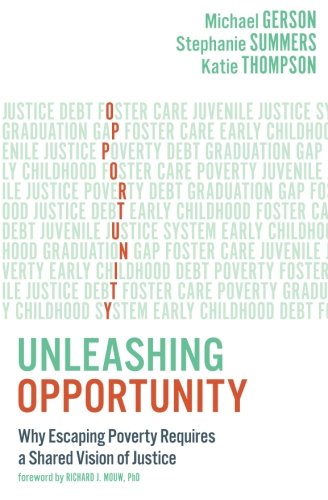 Public Justice. In Unfolding Opportunity: Why Escaping Poverty Requires a Shared Vision of Justice (Falls City Press; $11.99.) Falls City and CPJ give us a handful of topics that are obstacles for those trying to get out of poverty, and areas in need of attention and reforming efforts on the part of those who want to be serious about actually doing something to fight poverty. It’s brief chapters and practical tone make it ideal for young justice activists, it seems, almost a handbook for faithful Christian engagement. In each topic, there are three sections, each penned by either Michael Gerson (famous pundit and former White House speech writer), Stephanie Summers (Director of CPJ) and Katie Thompson (young justice advocate, editor of the CPJ Shared Justice blog.) They look at the facts about the issue, frame it in light of important Biblical themes and Christian insights, and then tell of case studies and good examples of work local groups are doing as an example of actual projects to be considered. Richard Mouw has a very helpful foreword. Three cheers for this great little resource, and three cheers for CPJ choosing this fresh new voice in the publishing world: Falls City Press.
Public Justice. In Unfolding Opportunity: Why Escaping Poverty Requires a Shared Vision of Justice (Falls City Press; $11.99.) Falls City and CPJ give us a handful of topics that are obstacles for those trying to get out of poverty, and areas in need of attention and reforming efforts on the part of those who want to be serious about actually doing something to fight poverty. It’s brief chapters and practical tone make it ideal for young justice activists, it seems, almost a handbook for faithful Christian engagement. In each topic, there are three sections, each penned by either Michael Gerson (famous pundit and former White House speech writer), Stephanie Summers (Director of CPJ) and Katie Thompson (young justice advocate, editor of the CPJ Shared Justice blog.) They look at the facts about the issue, frame it in light of important Biblical themes and Christian insights, and then tell of case studies and good examples of work local groups are doing as an example of actual projects to be considered. Richard Mouw has a very helpful foreword. Three cheers for this great little resource, and three cheers for CPJ choosing this fresh new voice in the publishing world: Falls City Press.
BEST OPPORTUNITY TO RECOMMEND BOOKS
The Washington Times special Insert: “The Power of Prayer: Enhance Your Life” November 30, 2015
We are truly privileged to get to sell books at all kinds of really nice venues, serving really fascinating organizations and ministries, and we’ve been assisted by some of our favorite people on the planet at these off cite events. From the low-key PC(USA) Wee Kirk Conference to the the pretty high-powered Redeemer Center for Faith and Work event, from the national Christian Legal Society annual gathering to any number of smaller clergy or Christian educational events, we are hosted well by good friends who value our book displays and sometimes give us an opportunity to speak, to teach, to do workshops on books, and to write for their own publications.
Well, what a surprise it was when the globally-known The Washington Times newspaper called, and invited me to do a column, a small side bar in a very large and attractive special edition insert they were doing right after Thanksgiving weekend. Their topic — with columns by dozens of prominent, mostly evangelical, leaders — was prayer, and you can see my list of a handful of the best books on prayer and spirituality in that colorful, professionally-done insert, and on their webpage. Better, I filled it out a little, added a few, and did my own expanded edition of that list at our own BookNotes, which you can see here. 20 great books on prayer briefly described!
Special thanks to the esteemed Thomas P. McDevitt, Chairman of The Washington Times and project editor Larry Moffitt who added my small voice to their big project. Afterwards, by the way, I got a lovely note from Philip Yancey, which — okay, I’ll admit it — just made my day. What a way to make a living, talking about good books with interesting folks!
BIGGEST BUILD-UP TO A NEW BOOK RELEASE (AND THE CONVERSATION AFTERWARDS)
 Go Set a Watchman Harper Lee (Harper) $27.99
Go Set a Watchman Harper Lee (Harper) $27.99
I hope you haven’t quickly forgotten the fascinating conversations about Atticus Finch, about rediscovering, as many readers did, the Harper Lee classic, To Kill a Mockingbird. We were happy that there were books coming out, or being re-marketed, about that great story. We had a nice in-store display including the very nice The Mockingbird Parables: Transforming People’s Lives Through the Power of Story by Matt Litton (Tyndale; $14.99) and a new four-session DVD curriculum called The Faith of a Mockingbird (Abingdon Press; $39.99.) New supplemental books and Lee biographies have come out, and they are all quite interesting.
But we want to recall not just the very good Go Set a Watchman book but the lively conversations it seems everyone was having on facebook and twitter and in barbershops and here in the store. There were articles pro and con, discussions about the ethics of the corporation and literary executives, and there were articles, pro and con, about the aesthetic quality of the writing, and there were articles, pro and con, about the theme and insight and moral of the story itself. This is all good, and we weighed in a bit. It was an honor to take pre-orders, sensing it was one of the significant moments in our career as book sellers.
Thanks to you who bought it from us, and thanks to you who wouldn’t out of principle. And thanks to everybody who expressed an opinion after having read it. Looking back, it was a great month in book land, eh?
BEST IDEA OF A BOOK RE-DO
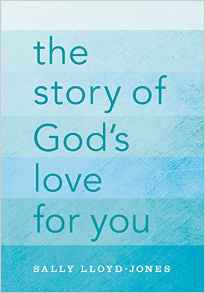 The Story of God’s Love for You Sally Lloyd-Jones (Zondervan) $14.99
The Story of God’s Love for You Sally Lloyd-Jones (Zondervan) $14.99
I sure, sure hope you know how much we appreciate the wonderful children’s picture Bible The Jesus Storybook Bible: Every Chapter Whispers His Name with the fabulously creative, energetic pictures by Jaego. It isn’t faultless, of course, but it is brilliant and so very useful. It comes in the regular, lovely square hardback, it comes in a larger size big hardback — which is fabulous and well worth the few extra bucks, by the way — and a deluxe gift edition that includes CDs of the stories being read out loud.
It is not surprising to me that sometimes customers feel like they are in a pinch. They really want to give The Jesus Storybook Bible to a fifth grader, or read it out loud to a junior high Sunday school class. Heck, I know adults that have read it out loud in their own sophisticated Old Testament courses. (Okay, maybe I’m not that sophisticated, really, but you get the point.) Sadly, with the childish pictures and kid’s book font on the cover, it just doesn’t work as a gift to a 13 year old. Nope.
So, some marketing geniuses somewhere came up with the idea of taking the same lush and insightful and well-worded text and put it out in a handsome, compact hardback with discreet icon symbols instead of the pictures, making the same text now available to older readers who now need not be embarrassed by reading a pre-school picture Bible. Same text, cooler book design but no pictures. What an idea. And we’ve sold a lot of them this past month, with many exclaiming that this is just what they needed. It’s the same Sally Lloyd-Jones text but with a new design, and a new title. The words are all the same. You can read a bit more that I wrote about it last month, here.
Hands in the air for marketing that doesn’t feel like a greedy add on, a cottage industry of spin- off stuff, as too often it is, but a really smart idea, filling a really important need, re-launching a classic in a fresh new way.
BookNotes
DISCOUNT
ANY ITEM MENTIONED
20% off
order here
takes you to the secure Hearts & Minds order form page
just tell us what you want
inquire here
if you have questions or need more information
just ask us what you want to know
Hearts & Minds 234 East Main Street Dallastown, PA 17313 717-246-3333
